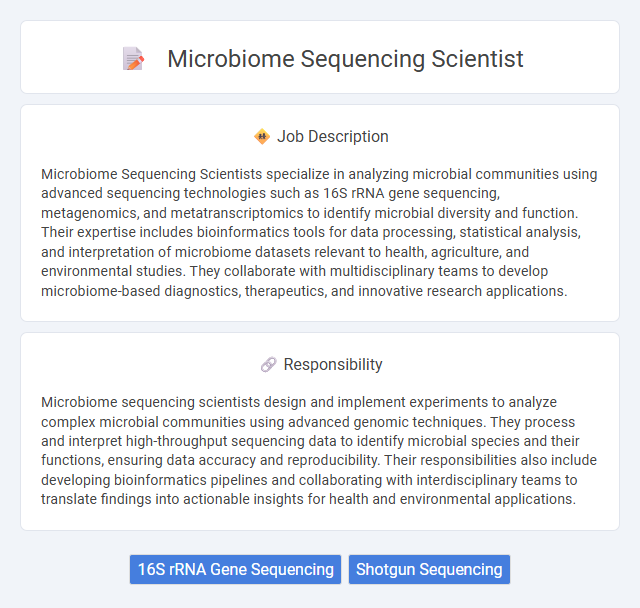
Microbiome Sequencing Scientists specialize in analyzing microbial communities using advanced sequencing technologies such as 16S rRNA gene sequencing, metagenomics, and metatranscriptomics to identify microbial diversity and function. Their expertise includes bioinformatics tools for data processing, statistical analysis, and interpretation of microbiome datasets relevant to health, agriculture, and environmental studies. They collaborate with multidisciplinary teams to develop microbiome-based diagnostics, therapeutics, and innovative research applications.
People with a strong background in molecular biology, bioinformatics, and microbiology are likely suitable for a Microbiome Sequencing Scientist role due to the technical demands of analyzing microbial communities. Those comfortable with data interpretation, laboratory techniques, and collaborative research might find this job aligns well with their skills and interests. Individuals lacking experience in high-throughput sequencing or computational analysis may face challenges adapting to this specialized field.
Qualification
A Microbiome Sequencing Scientist requires a strong background in molecular biology, genomics, or bioinformatics, typically holding a Ph.D. in a related field. Proficiency in next-generation sequencing (NGS) technologies and data analysis tools such as QIIME, Mothur, or R is essential. Experience in microbial ecology, metagenomics, and statistical methods for interpreting complex microbiome datasets is highly valued.
Responsibility
Microbiome sequencing scientists design and implement experiments to analyze complex microbial communities using advanced genomic techniques. They process and interpret high-throughput sequencing data to identify microbial species and their functions, ensuring data accuracy and reproducibility. Their responsibilities also include developing bioinformatics pipelines and collaborating with interdisciplinary teams to translate findings into actionable insights for health and environmental applications.
Benefit
Microbiome sequencing scientists likely experience significant benefits, including access to cutting-edge technology and opportunities for contributing to pioneering research in health and disease. The role probably offers collaboration with interdisciplinary teams, enhancing professional growth and innovation potential. Career advancement and meaningful impact on personalized medicine may also be probable advantages of this position.
Challenge
Microbiome Sequencing Scientists likely face the challenge of interpreting complex microbial data sets that may vary widely between samples, requiring advanced analytical skills and robust bioinformatics tools. The probability of encountering difficulties in maintaining sample integrity and avoiding contamination during sequencing processes appears high. Managing rapidly evolving sequencing technologies and integrating multidisciplinary knowledge could also present ongoing challenges in this role.
Career Advancement
Microbiome Sequencing Scientists leverage advanced genomic technologies to analyze microbial communities, driving breakthroughs in health, agriculture, and environmental sciences. Expertise in bioinformatics, metagenomics, and data interpretation opens pathways to leadership roles, including project management and strategic research development. Continuous skill enhancement and cross-disciplinary collaboration are critical for accelerating career growth in this rapidly evolving field.
Key Terms
16S rRNA Gene Sequencing
Microbiome Sequencing Scientists specializing in 16S rRNA gene sequencing analyze microbial communities by targeting the highly conserved 16S ribosomal RNA gene to identify and classify bacteria. This role involves utilizing advanced bioinformatics tools and next-generation sequencing platforms to generate high-resolution profiles of microbiomes from various environments or clinical samples. Expertise in quality control, sequence alignment, and diversity metrics is essential to accurately interpret complex microbial datasets and contribute to microbiome research or diagnostic development.
Shotgun Sequencing
Microbiome sequencing scientists specializing in shotgun sequencing analyze complex microbial communities by extracting and sequencing total DNA from environmental or clinical samples. Proficiency in high-throughput sequencing platforms such as Illumina and advanced bioinformatics tools like MetaPhlAn and HUMAnN enables comprehensive taxonomic and functional profiling of microbiomes. Expertise in data interpretation supports discoveries in microbial ecology, disease associations, and therapeutic target identification.
 kuljobs.com
kuljobs.com